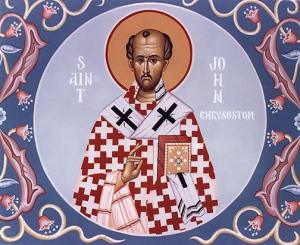 Feast of St Luke (October 18th).
Feast of St Luke (October 18th).
The greater part, however, of this work [the Book of Acts] is occupied with the acts of Paul, who “laboured more abundantly than they all” (1 Cor. 15:10).
And the reason is, that the author of this Book, that is, the blessed Luke, was his companion: a man, whose high qualities, sufficiently visible in many other instances, are especially shown in his firm adherence to his Teacher, whom he constantly followed.
Thus at a time when all had forsaken him, one gone into Galatia, another into Dalmatia, hear what he says of this disciple: “Only Luke is with me” (2 Tim. 4:10). And giving the Corinthians a charge concerning him, he says, “Whose praise is in the Gospel throughout all the Churches” (2 Cor. 8:18).
Again, when he says, “He was seen of Cephas, then of the twelve,” and, “according to the Gospel which ye received” (1 Cor. 15:5, 1), he means the Gospel of this Luke. So that there can be no mistake in attributing this work to him: and when I say, to him, I mean, to Christ.
And why then did he not relate everything, seeing he was with Paul to the end? We may answer, that what is here written, was sufficient for those who would attend, and that the sacred writers ever addressed themselves to the matter of immediate importance, whatever it might be at the time. It was no object with them to be writers of books: in fact, there are many things which they have delivered by unwritten tradition.
Now while all that is contained in this Book is worthy of admiration, so is especially the way the Apostles have of coming down to the wants of their hearers: a condescension suggested by the Spirit who has so ordered it, that the subject on which they chiefly dwell is that which pertains to Christ as man.
For so it is, that while they discourse so much about Christ, they have spoken but little concerning His Godhead; it was mostly of the Manhood that they discoursed, and of the Passion, and the Resurrection, and the Ascension. For the thing required in the first instance was this, that it should be believed that He was risen, and ascended into heaven.
As then the point on which Christ himself most insisted was, to have it known that He was come from the Father, so is it this writer’s principal object to declare, that Christ was risen from the dead, and was received up into Heaven, and that He went to God, and came from God.
John Chrysostom (c.347-407): Homilies on the Book of Acts, 1.








